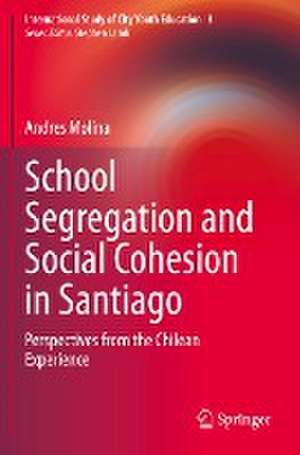School Segregation and Social Cohesion in Santiago: Perspectives from the Chilean Experience: International Study of City Youth Education, cartea 3
Autor Andres Molinaen Limba Engleză Paperback – 17 apr 2022
The separation of students based on their social background is a common feature of schooling in many modern systems. This is not only due to the influence of residential segregation but also to the effects of policies promoting educational privatisation, parental choice and student academic selection. By recognising the importance of schooling for citizenship and social integration, the chapters in this book explore how the separation of students throughout their school lives can contribute to the division of citizens beyond school, and how social segregation in school systems affect social cohesion more broadly.
By exploring the case of Santiago, Chile, the study is a timely contribution to the understanding of the roots of social division and the role that schools play in creating cohesive societies. The originality of the approach and the evidence presented draw on implications that should be of interest to a wider audience concerned with contemporary discussions on solidarity and its erosion by educational segregation in urban environments.
| Toate formatele și edițiile | Preț | Express |
|---|---|---|
| Paperback (1) | 722.12 lei 6-8 săpt. | |
| Springer International Publishing – 17 apr 2022 | 722.12 lei 6-8 săpt. | |
| Hardback (1) | 641.85 lei 6-8 săpt. | |
| Springer International Publishing – 17 apr 2021 | 641.85 lei 6-8 săpt. |
Preț: 722.12 lei
Preț vechi: 880.64 lei
-18% Nou
Puncte Express: 1083
Preț estimativ în valută:
138.19€ • 150.06$ • 116.08£
138.19€ • 150.06$ • 116.08£
Carte tipărită la comandă
Livrare economică 22 aprilie-06 mai
Preluare comenzi: 021 569.72.76
Specificații
ISBN-13: 9783030705367
ISBN-10: 3030705366
Ilustrații: XIII, 183 p. 21 illus.
Dimensiuni: 155 x 235 mm
Greutate: 0.29 kg
Ediția:1st ed. 2021
Editura: Springer International Publishing
Colecția Springer
Seria International Study of City Youth Education
Locul publicării:Cham, Switzerland
ISBN-10: 3030705366
Ilustrații: XIII, 183 p. 21 illus.
Dimensiuni: 155 x 235 mm
Greutate: 0.29 kg
Ediția:1st ed. 2021
Editura: Springer International Publishing
Colecția Springer
Seria International Study of City Youth Education
Locul publicării:Cham, Switzerland
Cuprins
1. Introduction.- 2. Education, Segregation and Social Cohesion.- 3. Organisation of Education in Chile and Santiago.- 4. Studying School Segregation and Social Cohesion in Secondary Schools in Santiago.- 5. How Segregated are Secondary Schools in Santiago?.- 6. Effects of Segregation on School Learning Environments and Student Attitudes towards School and Learning.- 7. Social Segregation and Student Cognitive, Social and Emotional Skills.- 8. Shaping Student Work and Study Plans.- 9. Social Segregation and Student Skills and Dispositions towards Social Cohesion.- 10. Concluding Remarks.
Notă biografică
Andres Molina is a sociologist with a Masters and a PhD in education, currently working as Senior Researcher and Advocacy Officer at The Smith Family. His main research interests are educational inequality, educational and social cohesion, educational policy, international comparative education, educational segregation, social inequality and youth transitions. Andres has worked for more than 17 years in the areas of education and social policy in several countries and international organisations, including Chile, the US and Australia, with key roles in the research, design, implementation and evaluation of educational policies and programs.
Textul de pe ultima copertă
This book examines the consequences of educational segregation from the perspective of social cohesion. It investigates the impact of separating students along socioeconomic lines on student attitudes, dispositions and outlooks considered important for social cohesion as well as on achievement, opening the discussion about the social costs of school segregation.
The separation of students based on their social background is a common feature of schooling in many modern systems. This is not only due to the influence of residential segregation but also to the effects of policies promoting educational privatisation, parental choice and student academic selection. By recognising the importance of schooling for citizenship and social integration, the chapters in this book explore how the separation of students throughout their school lives can contribute to the division of citizens beyond school, and how social segregation in school systems affect social cohesion more broadly.
By exploring the case of Santiago, Chile, the study is a timely contribution to the understanding of the roots of social division and the role that schools play in creating cohesive societies. The originality of the approach and the evidence presented draw on implications that should be of interest to a wider audience concerned with contemporary discussions on solidarity and its erosion by educational segregation in urban environments.
By exploring the case of Santiago, Chile, the study is a timely contribution to the understanding of the roots of social division and the role that schools play in creating cohesive societies. The originality of the approach and the evidence presented draw on implications that should be of interest to a wider audience concerned with contemporary discussions on solidarity and its erosion by educational segregation in urban environments.
Caracteristici
Analyses the consequences of school segregation beyond the well-known effects on academic achievement Uses more than 30 measures to explore the impact of school segregation on social cohesion in Santiago, Chile Explores influences on student outlooks and attitudes related to social cohesion



